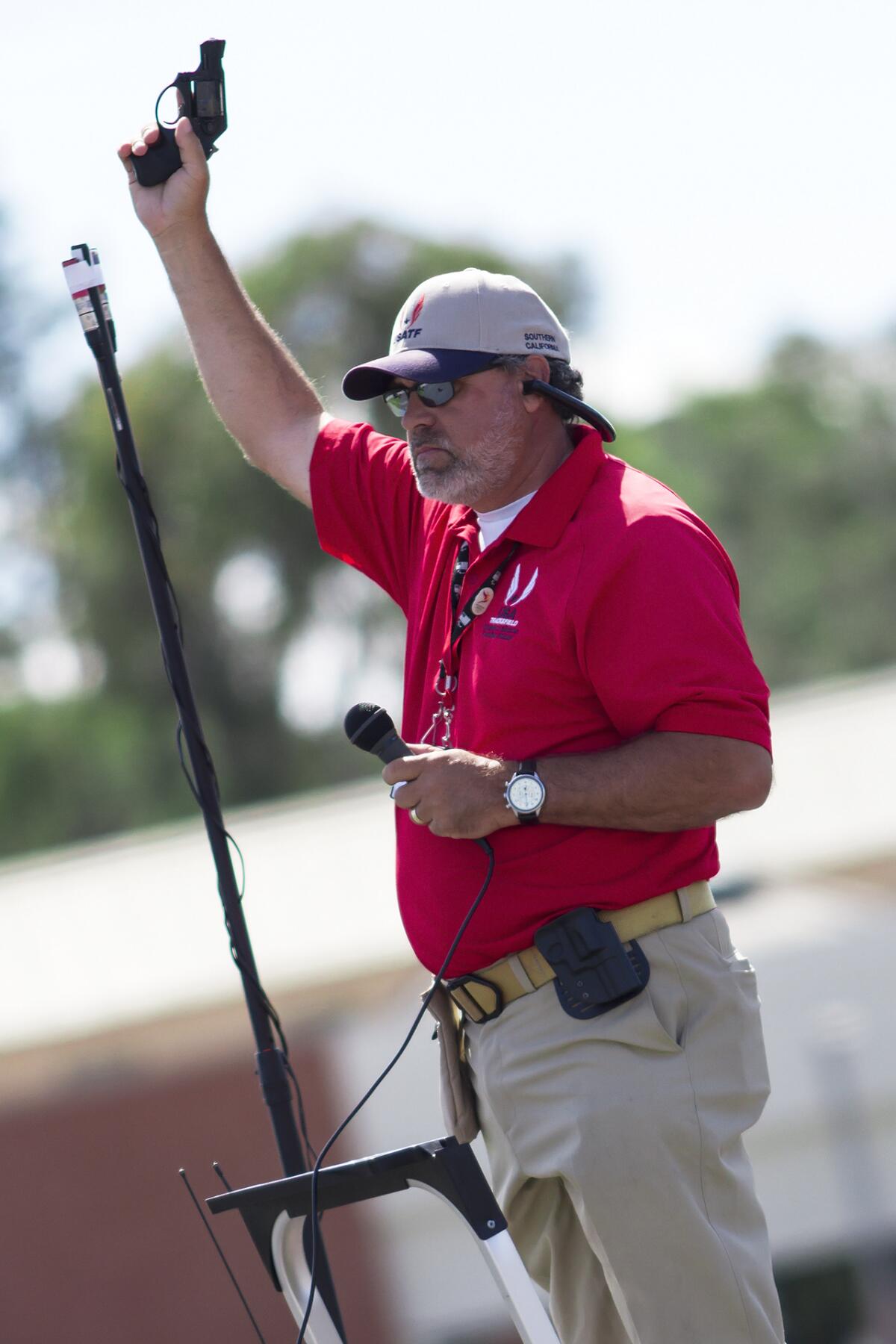Sports shutdown due to COVID-19 impacts game officials

- Share via
It has been nearly a month since the spread of the coronavirus shut down the sports world.
For some, hope did spring eternal that a return to the playing field might be possible, but deep down, they knew it to be improbable as the situation developed.
On April 3, the CIF State office and the 10 CIF section commissioners decided to call off the spring sports season outright, canceling the section, regional and state championships.
The last month has seen an outpouring of support and compassion for high school athletes as their seasons have come to an unexpected end.
Not to be lost in the shuffle are those who also exist within the symbiotic circle of the game: the officials.
For the past 12 years, officiating has been a way of life for Duke Fuller and his wife, Ann-Marie, who are both members of the USA Track and Field Southern California Officials Committee.
Fuller, 54, the Vice-Chair of Certification, regularly works as a starter at the high school level. He has also been a starter for the Paralympic Trials and lap counted for two U.S. Olympic Trials.
Ann-Marie can often be found officiating the high jump, a task she has handled in elite events like the Mt. SAC Relays. Fuller added that she has officiated high jump for CIF postseason meets.
Fortunately, Fuller and his wife both have jobs outside of officiating. He works in special education, while Ann-Marie teaches the fourth grade.
The loss of income will still have an impact on their lifestyle, as Fuller said that most of the money that he pulls in from officiating goes toward paying for household bills.
“For me, I’ve lost for March, almost $2,200 since everything started to get canceled,” Fuller said. “Everything got canceled for me on and after March 14. I had assignments all the way up through May.”
If officiating provided supplementary income for the Fullers, the loss of the spring season has changed that equation.
“I’ll have to modify my eating habits,” Fuller said. “It’s definitely affected us, and of course, I have hobbies and stuff like that, too, so I have to cut back on that. It’s been a change.”
Mike Cossack, 63, of Mission Viejo is the Umpire-in-Chief for Premier Girls Fastpitch. The organization is run by Dan Hay, who co-coaches the Marina High softball team with Shelly Luth.
An assignor of officials for the travel ball circuit and PGF, Cossack has umpired in high school for 28 years, something that he continues to do to this day.
Cossack, a retired postal service worker, joined a co-worker at a high school officiating meeting in 1992. He found himself not only working softball games, but football, basketball and baseball, as well.
“When we first started, it was more like a hobby, and it was a little extra change,” Cossack said of officiating. “As you go along and you get into travel ball and you’re working games every weekend, it turns into a big part of your income.”
Cossack said that the coronavirus stimulus package could provide some financial relief to some umpires who are able to claim unemployment as independent contractors.
“This is a livelihood for a lot of these gentlemen,” said Hay, the president of PGF. “They depend on that income from high school and travel ball to live, so some of these guys are working every single weekend, or they go straight from work to a high school game. They depend on that income.”
There are no games to officiate right now, but when the action resumes, there continues to be a need for officials. Cossack said that those who are umpiring are aging, and some new recruits would help.
“These kids, if they need to work during the week, … they can go out and do some softball games,” Cossack said. “You can make $400 to $500 on a weekend doing softball. You would have to flip a lot of burgers to make that much.”
For those who do not want to call balls and strikes behind the plate or patrol the bases much longer, Fuller hopes that he can sway them to join the next arena of their officiating career.
“I tend to promote or recruit umpires to work track and field because it’s not as strenuous on your body,” Fuller said. “I’ve been pretty successful with that, so that’s kind of one of my angles.”
::
Support our sports coverage by becoming a digital subscriber.
For more sports stories, visit latimes.com/socal/daily-pilot/sports or follow us on Twitter @DailyPilotSport.
All the latest on Orange County from Orange County.
Get our free TimesOC newsletter.
You may occasionally receive promotional content from the Daily Pilot.






